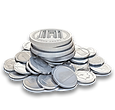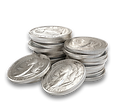🏆 How to Sell Platinum Coins: A Complete Guide for Investors and Collectors
- GoldsilverJapan

- Oct 13, 2025
- 5 min read
Platinum coins hold a unique position in the world of precious metals. Rarer than gold and silver, platinum has historically been valued not only for its industrial applications but also for its prestige and scarcity. Whether you're a seasoned investor, a collector looking to downsize, or someone who inherited a few pieces, selling platinum coins can be a profitable experience—if done correctly.
This comprehensive guide walks you through how to sell platinum coins, from identifying their true value to choosing the right selling platform, shipping securely, and understanding the tax implications. Throughout, we’ll also highlight trusted platforms like GoldSilverJapan, which provides a transparent and reliable environment for selling platinum coins globally.
🔍 Understanding the Value of Platinum Coins
Before you consider selling, it's essential to understand what makes a platinum coin valuable. Not all platinum coins are equal, and several key factors influence resale price.
1. Spot Price of Platinum
As of now, platinum is trading at around $1,650 USD per ounce. This fluctuates based on global supply and demand, geopolitical events, and industrial usage—especially in the automotive and renewable energy sectors.
Most bullion-grade coins will trade at or near the spot price, while collectible or proof coins can command premiums.
2. Type and Issuer
Some coins are purely investment-grade (bullion), while others are limited-edition or proof coins with added collector appeal. Popular platinum coins include:
American Platinum Eagle (USA)
Canadian Maple Leaf (Canada)
Australian Platypus (Australia)
Chinese Platinum Panda (China)
British Platinum Britannia (UK)
Coins from well-known mints and sovereign issuers are generally more trusted and liquid in the secondary market.
3. Condition and Grading
Coins that are graded by professional services like PCGS or NGC often command higher prices. These third-party certifications confirm the coin’s authenticity and condition, which is especially important for collectors.
A coin graded MS69 or MS70 can significantly outperform an ungraded version of the same type in resale value.
4. Rarity and Demand
Some platinum coins were minted in very small quantities or are part of discontinued series. These may attract collector premiums. For example, older issues of the Platinum Panda or the Isle of Man Noble can perform particularly well at auction or private sales.
🧾 Step 1: Authenticate and Identify Your Coin
Before you sell, take time to properly identify and verify what you have.
Determine the coin’s origin (country, mint, and year).
Measure weight and purity. Most platinum coins are .9995 pure and weigh 1 troy ounce.
Check for grading. If your coin is in a slab (plastic case), check the serial number on PCGS or NGC websites.
Look for mintage figures. Coins with lower mintages often perform better, especially if demand is high.
If you’re unsure about your coin, consider a free consultation from a reputable dealer or numismatic expert.
📈 Step 2: Monitor Market Conditions
Timing matters. Platinum is more volatile than gold, meaning prices can fluctuate sharply over weeks or months.
Use reputable sources like Kitco, Investing.com, or GoldSilverJapan’s pricing tools to monitor daily price changes.
If you're not in a rush, consider waiting for favorable price movements.
Rising industrial demand or geopolitical tension can push prices higher.
GoldSilverJapan, in particular, offers real-time platinum pricing based on international markets. You can see both selling and buyback prices directly on their website, helping you make better timing decisions.
🛍️ Step 3: Choose the Right Selling Method
Where you choose to sell your platinum coins can greatly impact how much you receive.
A. Local Coin Shops or Bullion Dealers
Pros:
Instant payment
No shipping needed
Cons:
Lower offers due to dealer margins
Limited interest in numismatic coins
B. Online Marketplaces (eBay, Mercari, Yahoo Auctions)
Pros:
Large buyer pool
Potential for higher prices
Cons:
Risk of returns and scams
Fees (platform + payment processor)
Requires accurate listings and shipping
Use these platforms for graded or collectible coins, and be cautious of chargebacks or counterfeit claims.
C. Online Precious Metals Platforms
Websites like APMEX, JM Bullion, and Money Metals Exchange buy back platinum coins, mostly at prices close to spot.
Pros:
Reputable businesses
Easy to sell bullion
Cons:
Not ideal for rare or graded coins
Requires shipping and trust in inspection process
D. GoldSilverJapan – Trusted Selling Platform
For those located in Japan or who have access to international shipping, GoldSilverJapan stands out as one of the most cost-efficient and transparent options for selling platinum coins.
Why Consider GoldSilverJapan?
✅ Lowest premiums in Japan for both buying and selling platinum coins
✅ Highest buyback rates in the domestic market, with real-time pricing visible online
✅ Graded coins also accepted, with live price reference
✅ Multilingual support: Services available in Japanese, English, and other major languages
✅ Educational content: Their YouTube channel helps users understand coin valuation, authentication, and global market trends
If you're holding investment-grade platinum coins or rare collector pieces, GoldSilverJapan provides a platform that combines competitive pricing with industry expertise—without pressure or hidden fees.
📦 Step 4: Shipping and Safety
If you choose to sell to an online dealer or customer, shipping your coin safely is critical.
Packaging Tips:
Use slab holders, bubble wrap, and padded mailers.
Avoid writing “coin” or “platinum” on the package exterior.
Always insure your shipment for full value.
Check the platform’s shipping instructions. GoldSilverJapan, for example, provides step-by-step packaging and submission guides for domestic and international sellers.
💵 Step 5: Payment and Transaction
Make sure to clarify:
Payment timelines: How soon after coin inspection will you be paid?
Payment methods: Most trusted dealers use bank transfers or PayPal.
Deductions: Will you be charged inspection or testing fees?
GoldSilverJapan offers bank transfers in JPY or foreign currencies and typically releases payments quickly after verifying the coin’s authenticity and condition.
⚖️ Step 6: Tax Considerations
Selling platinum coins may involve tax obligations, depending on your local laws.
In some countries, profits from selling precious metals are treated as capital gains.
Depending on the holding period and sale amount, different tax rules may apply.
Documentation such as purchase receipts or grading reports can help validate your cost basis.
Consult a qualified tax advisor for clarity on your region’s policies.
🧠 When Not to Sell
In some cases, it may be better to hold your platinum coins. Consider delaying your sale if:
Spot prices are low or declining
Inflation is high, and you want to hold hard assets
You own a coin with increasing numismatic demand
Also, some special edition or rare platinum coins increase in value over time, especially when certified and well-preserved.
📊 Most Popular Platinum Coins for Resale
Coin | Issuer | Best for |
American Platinum Eagle | U.S. Mint | High liquidity in U.S. |
Canadian Maple Leaf | Royal Canadian Mint | Global investors |
Platinum Britannia | Royal Mint (UK) | European demand |
Platinum Panda | China Mint | Collector interest |
Australian Platypus | Perth Mint | Scarcity and beauty |
These coins are typically recognized internationally and easier to resell across borders.
🧰 Helpful Tools & Resources
Spot Price Trackers: Kitco, GoldSilverJapan
Coin Authentication: PCGS, NGC verification tools
Market Research: eBay sold listings
Educational Videos: GoldSilverJapan YouTube
Coin Forums: Reddit r/coins, CoinTalk
🔚 Final Thoughts
Selling platinum coins can be both financially rewarding and educational—especially if you take the time to evaluate your options, use reputable platforms, and understand what influences value.
Key Takeaways:
Check spot prices and know your coin's type and grade
Consider real-time pricing tools like those offered by GoldSilverJapan
Explore multiple selling channels before making a decision
Ensure secure shipping and clear documentation
Consult professionals for tax and legal matters if needed
In the rapidly evolving world of precious metals, knowledge, timing, and trust are your most valuable assets. By using platforms like GoldSilverJapan, you get access to transparent pricing, expert support, and one of the most competitive buyback offers in the industry.
Whether you're liquidating for profit, reallocating investments, or simply making room in your collection, this guide can help you sell smart and securely—wherever you are in the world.










Comments